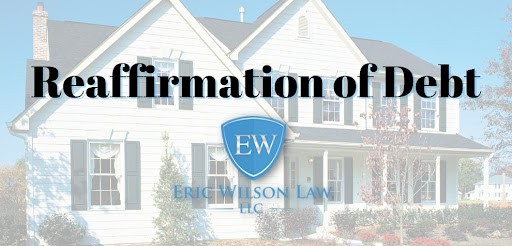Sometimes life gets bumpy, and we face financial difficulties. This may be due to circumstances such as a job loss, reduction in income, or illness. For many people overwhelmed by mounting debt, a Chapter 7 bankruptcy is a huge relief. This type of bankruptcy eliminates unsecured debt and some secured debts. However, if you want to hold on to some of your property, reaffirmation of debt may be the best avenue to keeping your car or home.
After a Chapter 7 bankruptcy debt discharge, the debtor is generally not liable for their secured debt anymore. If you can’t pay your debt in the future, the creditor can take the collateral back through a foreclosure or repossession.
In many cases, simply staying current with your payments is enough. Some creditors may require a reaffirmation of debt so you may keep the property.
Eric Wilson Law specializes in bankruptcy law. Eric Wilson and his team of experienced bankruptcy attorneys can work with you to create the best solution for your debt problems. Our Tuscaloosa reaffirmation bankruptcy attorneys are here to help you reduce your financial stress and obtain debt relief. To get started on your attorney-client relationship, call 205-349-1280 today.
What Is Reaffirmation?
Filing for bankruptcy means escaping debt that you cannot repay. When a person goes through bankruptcy proceedings, they can enter an agreement with a creditor to repay part or all of their debt. This is called reaffirmation.
When a borrower commits to a reaffirmation agreement, they typically retain possession of the debt’s collateral if they can repay the debt in full. Collateral is an asset such as a car or a home.

Secured vs. Unsecured Debt
The type of debt backed by collateral is called secured debt. If you cannot keep up with your payments and default on your loan, the creditor can take the collateral back. As a tangible asset, it can be sold, and the proceeds can be used to repay the total debt.
On the other hand, unsecured debt is not secured by anything. For instance, credit card debt and medical debt are unsecured. This type of debt is typically discharged in a Chapter 7 bankruptcy.
Borrowers should reaffirm only secured debts if they wish to keep the collateral and know they can pay for it. Never reaffirm an unsecured debt.
The type of debt you have helps determine the type of bankruptcy you file.
Who Should Reaffirm?
You should only reaffirm a debt if you are current with your payments and know you can keep up with future payments. The amount of equity you have in the property is also essential. If the asset is worth significantly less than what you owe on the loan, you should not sign a reaffirmation agreement. This holds especially true for a vehicle loan since cars depreciate over time.
Lenders can technically repossess the property if the debtor doesn’t follow the rules in a reaffirmation agreement. This rarely happens if the debtor keeps making payments on time. Most lenders don’t want the collateral. Instead, they want the money owed for the asset.
In some cases, the lender will want to enter into a reaffirmation agreement if the debtor intends to keep the property. Once again, do not reaffirm a debt unless you are confident that you can make timely payments.
Whether a reaffirmation agreement is required is up to the lender. Keeping your car or home after bankruptcy is possible by maintaining regular and timely payments. It’s known as “stay and pay,” and some lenders allow it.

Stay and Pay
If you have a mortgage, it is usually easier to “stay and pay.” This is a loan with land and a house as collateral. The laws for foreclosure make it hard for the mortgage company to meet the requirements to take the home if the loan is current. This holds true even if there is no affirmation agreement on file.
Please speak with your lender to understand their expectations. Some creditors want you to sign a reaffirmation agreement to keep the property. This is a requirement for most car financing companies. Even if you keep up with your car payments, they may threaten repossession if they don’t have a reaffirmation agreement for your car loans.
What Are the Benefits of Entering Into a Reaffirmation Agreement?

There are several benefits to reaffirming debt.
- First, it lets the lender know you’ll continue paying the loan. As the lender reports these payments to the credit reporting agencies, timely payments may raise your credit score after bankruptcy.
- Some lenders do not report payments to the credit bureaus if they don’t have a signed reaffirmation agreement.
- A reaffirmation agreement means your lender will not reclaim your property as long as you continue paying the debt on time.
- The lender often maintains communication with you when a signed reaffirmation agreement is on file. Many lenders may refuse to work with you or even provide information or monthly loan statements without an agreement.
What Are the Cons of Entering Into a Reaffirmation Agreement?
While there are positives to entering into a reaffirmation agreement, there are also negatives.
- You remain personally liable for a debt even after bankruptcy if you reaffirm it.
- When you fall behind on payments after signing an agreement, the lender can take the property and sue you for any deficiency. There is a deficiency when a lender sells the property for less than your loan balance.
You are not responsible for a deficiency if you keep the property without an affirmation agreement. The lender can still repossess the collateral, but you are not personally responsible for it.
What Happens When You Reaffirm an Account?
When you reaffirm an account, you agree with the creditor that:
- You remain personally liable for the debt.
- You will pay all or part of the debt.
- The creditor agrees not to reclaim the asset as long as you stay current on your car loan or mortgage payments.

How Does a Reaffirmation Affect My Credit?
After reaffirming a loan, it should not show on your credit report as part of the bankruptcy. Once you pay the loan in full with no late payments, it remains as a positive account on your credit report for ten years.
Any negative accounts and those discharged in bankruptcy only stay on your credit for seven years. Since they are beneficial to your credit report, positive accounts remain in your history longer.
Steps to Reaffirm Debt
An agreement is signed and filed with the court. This must be completed before the debt discharges.
Reaffirmation agreements contain many disclosures per the Bankruptcy Code. These disclosures advise the bankrupt person of many factors, including:
- The method used to calculate the debt,
- The total amount of debt included in the reaffirmation,
- And whether or not your bankruptcy or personal liability remains which is dependent on if your debt is/isn’t discharged.
You must sign and file a current expense, as well as an income statement to show that the income paying your expenses is enough to cover the reaffirmed debt.
Can You File a Reaffirmation Agreement After Bankruptcy Discharge?
No, your debt is no longer eligible for reaffirmation once discharged. This also holds if the bankruptcy court closes your case.
If you’re considering reaffirmation, you’ll need to start the process before the bankruptcy discharge date. A Tuscaloosa bankruptcy lawyer at Eric Wilson Law knows the ins and outs of Chapter 7 bankruptcy and debt reaffirmation. Please contact our law firm today if you’re thinking about reaffirming secured debt in your bankruptcy case.
Gain Control of Your Debts by Speaking With a Bankruptcy Attorney

Bankruptcy wipes out your debt, ending wage garnishments and harassment by creditors. However, you may continue paying secured debts to keep property such as a vehicle or home.
Experienced Tuscaloosa reaffirmation bankruptcy lawyers help you determine whether reaffirming a debt is in your best interest. Your attorneys will evaluate your total monthly income and ability to make payments on the debt. A reaffirmation of your debt legally obligates you for its repayment.
At Eric Wilson Law, we realize filing for bankruptcy is not an easy decision which is why we make it a priority to protect your sensitive or confidential information. Our legal team also makes the bankruptcy process easy by discussing your options and keeping you in the loop every step of the way.
Contact bankruptcy attorney Eric Wilson today at (205) 349-1280 for a free evaluation of your case. We look forward to providing professional help for your bankruptcy case.
Eric Wilson Law handles a range of debt-related issues for clients in Tuscaloosa and the surrounding areas, including student loans and tax debt, creditor harassment, consumer rights and protection, foreclosures, and Chapter 13 bankruptcy.


